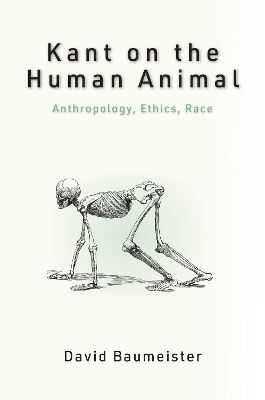
Kant on the Human Animal
Anthropology, Ethics, Race
Seiten
2023
Northwestern University Press (Verlag)
978-0-8101-4468-2 (ISBN)
Northwestern University Press (Verlag)
978-0-8101-4468-2 (ISBN)
- Titel z.Zt. nicht lieferbar
- Versandkostenfrei
- Auch auf Rechnung
- Artikel merken
Offers an account of Kant’s understanding of the human animal through examination of a range of published works and lecture transcripts from the 1770s to the 1790s, with particular attention paid to texts concerning anthropology, ethics, and human nature.
Kant on the Human Animal gives an account of Kant’s understanding of the human animal through examination of a range of published works and lecture transcripts from the 1770s through the 1790s, with particular attention paid to texts concerning anthropology, ethics, and human nature. It is argued that too exclusive a focus on Kant’s view of the moral differences between humans and other animals neglects the substantial role played by animality in Kant’s conception of the human being. Though the possession of reason grants humans access to a practical realm unavailable to other animals, thus establishing a basic tension between humanity and animality, such unique access does not and cannot negate the human’s status as an animal being. Indeed, as analysis of Kant’s anthropology and theory of human nature shows, human animality provides the necessary physiological basis for humanity’s development in the world, whether individually or historically. To become properly human must therefore be seen, as Kant himself does, as the achievement of one particular animal—the “rational animal” that is the human being.
Kant on the Human Animal gives an account of Kant’s understanding of the human animal through examination of a range of published works and lecture transcripts from the 1770s through the 1790s, with particular attention paid to texts concerning anthropology, ethics, and human nature. It is argued that too exclusive a focus on Kant’s view of the moral differences between humans and other animals neglects the substantial role played by animality in Kant’s conception of the human being. Though the possession of reason grants humans access to a practical realm unavailable to other animals, thus establishing a basic tension between humanity and animality, such unique access does not and cannot negate the human’s status as an animal being. Indeed, as analysis of Kant’s anthropology and theory of human nature shows, human animality provides the necessary physiological basis for humanity’s development in the world, whether individually or historically. To become properly human must therefore be seen, as Kant himself does, as the achievement of one particular animal—the “rational animal” that is the human being.
Acknowledgments
Abbreviations
Introduction
1. Animals, Human and Otherwise
2. Animality and Morality
3. Anthropologies of the Human Animal
4. Animality Unfolded
5. Animality and Race
Epilogue: The Animal-Rational Axis
Notes
Bibliography
Index
| Erscheinungsdatum | 31.03.2022 |
|---|---|
| Verlagsort | Evanston |
| Sprache | englisch |
| Maße | 152 x 229 mm |
| Gewicht | 363 g |
| Themenwelt | Geisteswissenschaften ► Philosophie ► Ethik |
| Geisteswissenschaften ► Philosophie ► Philosophie der Neuzeit | |
| Sozialwissenschaften ► Ethnologie | |
| Sozialwissenschaften ► Soziologie | |
| ISBN-10 | 0-8101-4468-9 / 0810144689 |
| ISBN-13 | 978-0-8101-4468-2 / 9780810144682 |
| Zustand | Neuware |
| Informationen gemäß Produktsicherheitsverordnung (GPSR) | |
| Haben Sie eine Frage zum Produkt? |
Mehr entdecken
aus dem Bereich
aus dem Bereich


